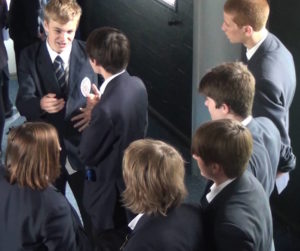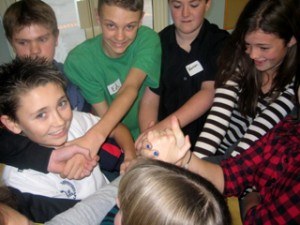We've divided this page into 3 types of resource, all carefully selected from our Philosophy Circles Resource Pack.
Thinkers' Games: Physical activities to kick off discussions. Everyone shows their thinking at once by committing to moving themselves, or some stuff, and then justifying their choices. Excellent for first time P4C'ers (adults and children!)
Spot and Stripe: 1 minute videos in which we start a debate, and hand it over to the children to argue out!
Session Plans: 30 minute sessions to embed P4C into your curriculum. Each plan follows the Philosophy Circles method to get maximum thinking with minimum teacher-effort!
Thinkers' Games
Pistols at Dawn
A great Thinkers' Game to get people to enjoy disagreeing with one another, and designed to get lots of people speaking at once. Perfect for beginning any debate or discussion within your KS3 curriculum. Download here.
“Argumentag Wrestling is like Tag Wrestling on the telly, except that instead of throwing eachn other to the ground and bellyflopping each other, you’re wrestling with your brains instead.” Download here.
Particularly when dealing with teenage groups who may be inhibited about sharing their views, it’s a good idea to get them saying anything before you expect them to say something of consequence. Download here.
Enjoyed using these with your classes?
These are taken from Jason's mini-book Thinkers' Games - available for £2.50 from our Shop.
Curriculum-Based Session Plans
Each of our session plans follow the Philosophy Circles method: Get Moving, reach a Y-Question, and Take a Back Seat.
The plans below come from our Philosophy Circles Premium Resource Pack - where you'll find over 150 plans for every subject in the curriculum.
English
Definitions
For some, the original aim of P4C is to deconstruct concepts. This resource asks students to deconstruct familiar concepts and trying to re-establish meaning through collaborative dialogue.
Mathematics
Tulips from Amsterdam
The Tulip craze from 1634 isn't just a wonderfully simple example of how markets work. but it also raises philosophical questions about value.
Science
When do you stop being a child?
An excellent resource to explore the concepts of childhood/adulthood beyond the syllabus!
Geography
The Cowman and the Farmer
An enquiry that asks questions about land, rights and ownership. Fantastic as a philosophical bridge between Physical and Human Geography.
History
When should you follow orders?
Members of the Armed Forces have always had to follow orders. But are there any exceptions? Set in WWII, this stimulus gives pupils two perspectives on a true story.
PSHE
"The Us"
This stimulus is an adaptation of John Rawls’ thought experiment, “The Veil of Ignorance”. Would it create a fair society?
Modern Foreign Languages
How to embed P4C in languages
Elements of P4C could be used to ensure that pupils are prepared for their exams, and can express ideas in the target language.
Art
Once there was an artist...
If you could draw one picture, and whatever was in the picture, you could have it, what would you draw?
Computing
Taught by a robot?
These stimuli were suggested by Brynhildur Sigurðardóttir, a bulletin reader from Iceland, about a robot teacher that has been used to show new technology to Japanese children.


